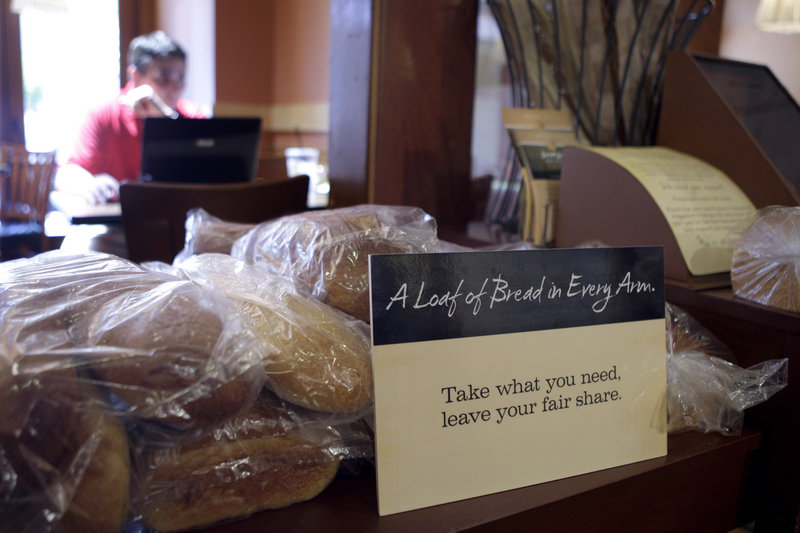CLAYTON, Mo. – As the first crowd of customers filed into Panera Co.’s nonprofit restaurant here, only the honor system kept them from taking all the food they wanted for free.
Ronald Shaich, Panera’s chairman, admitted as he watched them line up that he had no idea if his experiment would work. The idea for Panera’s first nonprofit restaurant was to open an eatery where people paid what they could. The richer could pay in full, or extra. The poorer could get a cheap or even free meal.
A month later, the verdict is in: It turns out people are basically good.
Panera, which operates 1,400 franchised and corporate-owned bakery-cafes across the country, plans to expand the nonprofit model around the nation, opening two more locations within months.
“I guess I would say it’s performing better than we even might have hoped in our cynical moments, and it’s living up to our best sense of humanity,” Shaich said in an interview.
Its cashiers tell customers their orders’ “suggested” price based on the menu. About 60 to 70 percent pay in full, Shaich said. About 15 percent leave a little more and another 15 percent pay less, or nothing at all. A handful have left big donations, like $20 for a cup of coffee.
The restaurant took in $100,000 in revenue its first month. He declined to say what kind of margin this left between total costs and revenue, but he predicted the restaurant will be able to cover its costs within months and eventually generate extra cash for charitable programs.
Panera’s nonprofit plan is the largest example yet of a concept called community kitchens, where businesses operate partly as charities. People who need a discount, or even free food, can get it with no questions asked.
Shaich borrowed the idea from a restaurant in Denver and then connected with Denise Cerreta, who runs The One World Salt Lake City restaurant with a sliding scale menu. Cerreta’s community kitchen and others he looked into were impressive, Shaich said, but operated on a smaller scale than Panera could afford to run.
The Clayton store is run under the company’s St. Louis Bread Co. banner by a nonprofit organization called Panera Cares that publicly traded Panera Co. supports. But Panera won’t bear the nonprofit’s losses if the experiment fails. For the expansion, Panera spokeswoman Kate Antonacci said, the nonprofit is considering locations that, like Clayton, are upscale but accessible to lower-income customers. In Clayton’s case, St. Louis County’s offices and courthouse are nearby.
The Clayton Panera has hardly turned into a soup kitchen. Its longtime business clientele kept the lunch hour busy last week, with well-dressed workers clustered around laptops and talking on cell phones.
Financial adviser Jeff White, 34, said he was a regular at the location before it closed and reopened as the nonprofit in late May and hasn’t changed his dining habits. White said he usually rounds up when he pays his tab, because he wants the “intriguing” experiment to succeed.
But there were new customers — drawn to the bargains. Anna and Bennie Ward heard about the pay-what-you-wish model on the news. Anna thought it was too good to be true, so she researched it on the Internet before driving over for lunch with Bennie their two kids.
It was a rare chance for the couple to dine out, Anna said. Bennie is laid off and her only income is from disability checks. The family ordered sandwiches, iced coffee drinks and bread to go.
“Near the end of the month is difficult for us. If it was not for help from friends and community, I don’t know where we would get our last meal,” Anna Ward said after the meal. “To be able to go there and eat an actual meal and feel full is such a blessing.”
Shaich had moments of doubt during the restaurant’s first weeks, including when a teenager bought $40 worth of sandwiches to go and put just a few dollars on a credit card.
“You get a little bummed out, and you wonder whether people will get it,” he said.
To control freeloaders, signs remind customers that “You’re on your honor.” Workers stationed at the door, who explain the concept to customers, told a group of teenagers who ate there last week that the store is “not a handout.”
Shaich said the nonprofit chain is a challenge to other corporations to push their philanthropy beyond writing checks. More valuable, he said, is to put their supply chains, technology and knowledge to use.
“The fascinating question to me is: Can we take our skills and apply them very directly to solving some of the problems” in society, he said. “And not just for publicity, but to make a difference.”
Send questions/comments to the editors.



Success. Please wait for the page to reload. If the page does not reload within 5 seconds, please refresh the page.
Enter your email and password to access comments.
Hi, to comment on stories you must . This profile is in addition to your subscription and website login.
Already have a commenting profile? .
Invalid username/password.
Please check your email to confirm and complete your registration.
Only subscribers are eligible to post comments. Please subscribe or login first for digital access. Here’s why.
Use the form below to reset your password. When you've submitted your account email, we will send an email with a reset code.